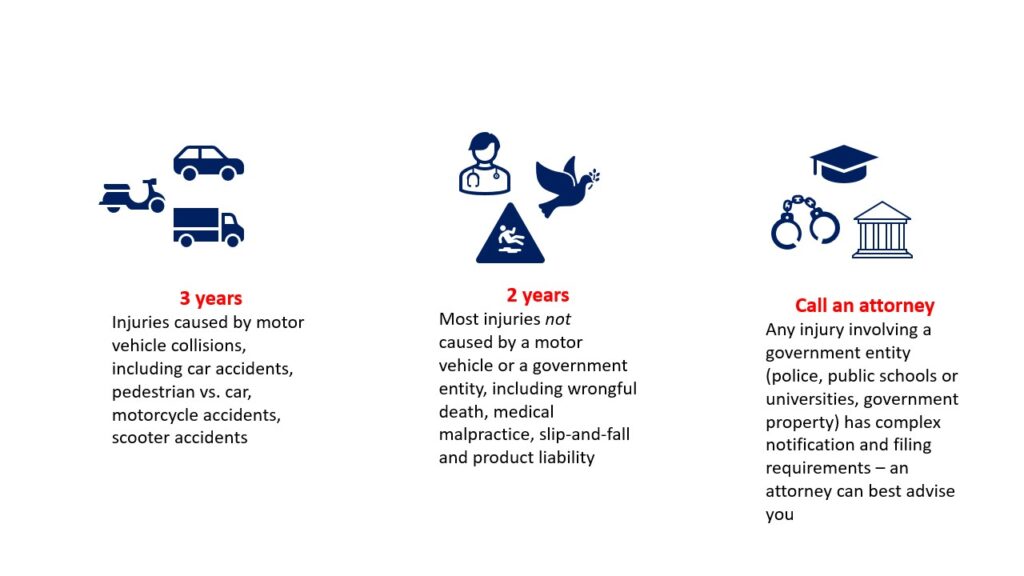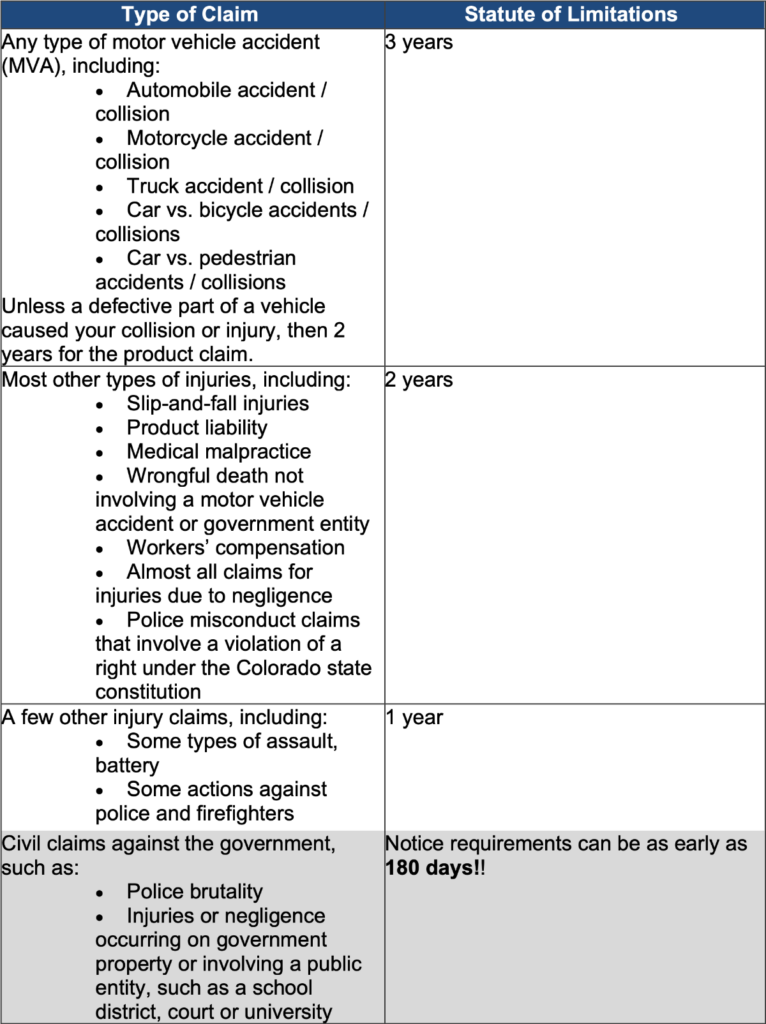Colorado Personal Injury Statute of Limitations
A statute of limitations can best be described as the amount of time in which an individual must file a lawsuit. Failure to file your lawsuit within this time limit will almost always result in your case being dismissed. Even so, there are a few exceptions to the rule.
In Colorado, the amount of time you have under the personal injury statute of limitations will depend on how you were injured. For example, the time limit for a lawsuit related to injuries received in a motor vehicle accident is longer than the time limit to file a lawsuit for a slip-and-fall injury.
This blog will answer the questions you have about the personal injury statute of limitations in Colorado and how it relates to your case.
Statute of limitations for personal injury lawsuits
In most cases, the clock starts ticking when the injury occurs, even if the symptoms of your injuries start later. It is not unusual for those who are injured to experience a delay in onset of symptoms, which is why it is so important to seek care quickly and to contact an attorney who can keep an eye out for your well-being.
As a general rule, most personal injury lawsuits have a time limit of two years, unless they involve a motor vehicle, in which case, the time limit is three years.
Some Colorado Statute of Limitations Guidelines
Generally, but not in every circumstance, the statutes of limitation work like this in Colorado:

CO Statute of Limitations Graphic
For a bit more detail

Claims against a government entity – cases involving police brutality and misconduct, cases against a school district, cases involving government property, including government vehicles – have complex rules and notification requirements. It is best to involve a lawyer who can advise you and help you navigate the process so you can still get justice. That is also true for certain types of cases against your own auto insurance carrier related to underinsured motorist coverage. When in doubt about a Colorado statue of limitation and how it applies to your personal injury case, just talk to an experienced personal injury lawyer, and let us sort out the complexities for you, based on your specific circumstances.
Why is there a personal injury statute of limitation?
Statutes of limitations can stop injured people from getting justice, which is why it is important to get legal help as soon after an injury as you can. These statutes exist because big companies have paid a lot of money to lawmakers to make it harder for people to hold those big companies accountable. However, there are also a few good reasons to have at least some sort of time limit on a lawsuit. Over a very long time, witness memories may not be as reliable. Evidence that would have been needed to defend a case might have been destroyed. Statutes of limitations, after the passage of many years, have their place in a fair justice system, but many of them are entirely too short and that is primarily true because of powerful corporate financial interests. Again, it is critical to consult with a qualified injury attorney quickly.
What happens if you don’t file your personal injury lawsuit in time?
If you file your personal injury lawsuit after the statute of limitations deadline has passed for your particular case, the defendant can ask the court to dismiss your case. And the court will most likely agree, unless you have a valid exception that justifies the late filing.
It is never too soon to seek legal representation, even if your accident just occurred or you are still in treatment. When you are injured, you don’t want to watch the clock or worry about nuances in legal deadlines—you want to focus on getting better. I take care of this for my clients, and I advise them about the right timing for negotiating their case and the right timing for filing a lawsuit.
Even when you haven’t heard from your injury lawyer for a while, work is very likely being done on your case that you are not aware of (good communication helps!). In cases where an injured person engages a lawyer late or close to the statute of limitations, the workup and preparation for formal litigation will have to be rushed, and some may not be able to be done at all. In some cases, your case may not be as comprehensive and persuasive as it would have been if you had had representation from the beginning, and some attorneys may decline to accept your case altogether.
Exceptions to the Colorado Statute of Limitations
Although there is a heavy emphasis on timely filing of your personal injury lawsuit, the state of Colorado does recognize that there are situations that can cause a justified delay. In these cases, the filing deadline can be extended.
The discovery rule
The statutes of limitations in Colorado typically establish a deadline to file a lawsuit that begins with the date of injury. However, they also contain language that can, in the right circumstances, change the start date to the date that an injury is discovered, or should have been discovered. So the “discovery rule” isn’t so much a stand alone rule, as just part of how the deadline is calculated anyway. It allows the plaintiff to file a claim within a certain period after the injury is discovered versus when the accident or incident occurred. This is because, in some instances, it is not possible for an individual to immediately know that they have been harmed. Application of the discovery rule in Colorado injury cases is very limited.
There is an expectation that a person should have known they might be injured, for example, after a car wreck. If you are unaware of an injury after a car wreck for more than three years, you were going to have a problem proving a connection between the injury and the car wreck anyway. So in most personal injury cases where there is a known event that caused an injury, including trip-and-falls and slip-and-falls, motor vehicle collisions, etc, the statute of limitations is almost always going to start from the date of the fall, car wreck, or whatever else caused the injury. For those reasons and others, it is important to note that the discovery rule will not apply to the majority of injury cases, and the where it does, time frame in which you can present a post-discovery claim in some cases may be very short. This is another example of the importance of talking to an attorney who can tell you how the statute of limitations will likely be applied based on your specific facts.
Tolling
The statute of limitations may pause temporarily under some specific circumstances.
Examples of tolling circumstances include:
- The plaintiff is a minor: A minor that is under the age of 18 years may not be able to sue the defendant until they are of legal age. Sometimes when a child is injured, there may be related claims that are actually the responsibility of the parents to pursue. So while the child’s claims may be paused, those of the parents, in some cases, may not.
- Mental incapacitation: If, after the accident, the victim is no longer mentally competent as a result of an injury, the statute of limitations may be put on hold until they can comprehend their rights and their competency is restored.
- Parties enter a tolling agreement, which is essentially an agreement between all the parties to a case that the time limit that would have applied under the statute of limitations, is paused for a set amount of time. Usually this happens because the parties are hopeful that they can resolve a case without having to actually file it. Tolling agreements should only be considered based on the advice of an experienced attorney, and should only be written by your attorney.
Never rely on an exception to the personal injury statute of limitations without consulting an attorney. Never assume a court will agree with you later that a statute of limitations was paused, or does not apply, unless an attorney is advising you based on your specific circumstances.
More questions? Call, text, or schedule a meeting right now!
Every personal injury case is different. There are different circumstances that can affect the statute of limitations in your case, which is why it is important to consult with an accident lawyer as early in the process as possible. I am passionate about creating a custom plan and strategy for each client and case after listening carefully to the circumstances of their injury and how it is affecting all aspects of their life.
Consultations are free, and there is no obligation to do anything other than talk about your options. Call 303-339-8846. You can also schedule your free consultation with me at my office, at your home, or on Zoom / Facetime / Webex by clicking here.
